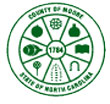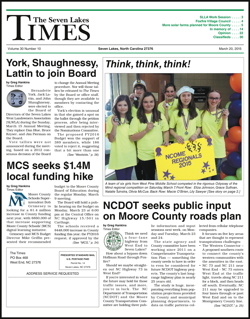 There's a new restaurant in Seven Lakes, but you wouldn't know it from the signage. And that created considerable frustration for the Moore County Board of Commissioners during their Tuesday, November 20 meeting.
There's a new restaurant in Seven Lakes, but you wouldn't know it from the signage. And that created considerable frustration for the Moore County Board of Commissioners during their Tuesday, November 20 meeting.
Adding an agenda item at the end of the meeting, Commissioner Picerno said he had spoken with a Seven Lakes business owner who was unable to obtain County authorization to replace the vinyl panels on two signs.
The signs in question, it emerged later in the conversation, are the two signs erected by property owner John Garner for the now-closed Mac's Breakfast Anytime restaurant adjacent to Seven Lakes Hardware. Greenbow's Restaurant has now opened in that space, and Garner wants to change the vinyl on the existing signs to reflect that fact.
Planning Director Debra Ensminger explained that both signs are illegal under the County's sign ordinance -- and were, in fact, illegal under that ordinance when they were erected in 2002.
 One of the signs sits on the roof of the building; the County's sign ordinance prohibits all roof signs. Ensminger told The Times that the roof sign was permitted by the County in 2002, but it was supposed to be mounted on the wall of the building, not on the roof. She told the Commissioners that there are only nine roof-mounted signs within the County's jurisdiction.
One of the signs sits on the roof of the building; the County's sign ordinance prohibits all roof signs. Ensminger told The Times that the roof sign was permitted by the County in 2002, but it was supposed to be mounted on the wall of the building, not on the roof. She told the Commissioners that there are only nine roof-mounted signs within the County's jurisdiction.
Acting County Attorney Robert Maxwell told the Board that most local jurisdictions ban roof-mounted signs because "they can become like a missile in a windstorm."
The second sign is a pole-mounted sign near NC Highway 211. The County permitted that sign in error in 2002, Ensminger told the Commissioners. It sits on a different tract of land than the restaurant and hardware store, and thus is technically an "off-premise advertising sign," which are not allowed in the VB-Village Business zoning district that includes the Seven Lakes Business Village.
Commissioner Picerno asked whether "there is anything we can do to assist this businessman," noting that the new business needs to let the community know it is open for business.
"Could we grant this business owner an opportunity to replace those panels?" Picerno asked. "Is there a way that we could do that legally?"
"Mr. Picerno, I'm sorry, there's not," came the reply from Attorney Maxwell.
Later, Commissioner Lea took another run at the same question. "The mistake was not made by property owner," Lea pointed out. "Given that the error is on the county side, is there any leniency that the county can give?
"No sir," the attorney replied.
Lea asked whether the sign was an "existing non-conforming use," which is the technical term for a use of property that was in place before the ordinance that forbids it was created. Such uses are often "grandfathered" -- that is, allowed to stand even though they violate the new ordinance.
But the signs in question were erected after the sign ordinance was approved and so are "illegal," rather than an "existing non-conforming use."
Under the current ordinance, Ensminger explained, the roof sign could be moved down and mounted on the wall of the building. Either it or the free-standing sign could be added to the existing Seven Lakes Hardware monument sign in front of the business. But those options are not acceptable to Garner, she explained.
The only other option is to amend the Sign Ordinance to make the signs legal, and that amendment would apply throughout the Village Business zoning district and throughout the County.
Ensminger told the Board that they would be reviewing the sign ordinance as part of the Unified Development Ordinance [UDO] beginning in January. Any changes to the ordinance aimed at addressing Garner's problem would also need to be reviewed by the Planning Board, which is, in fact, scheduled to take up the Sign Ordinance during its December 6 meeting.
The Board's lack of options to help solve Garner's problem clearly frustrated Commissioner Picerno.
"I am a little frustrated that we hear over and over and over the mantra that we need to reduce regulation to get people back to work," he said "and it seems like even the simplest things, that make common sense, are so hard to do . . . . so that a business owner, trying to employ people, can do those things. That is just something that crawls up the back of my neck."
